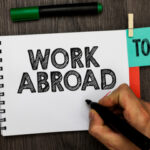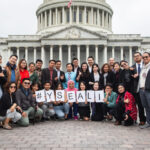The Ultimate Guide to Writing a Job Application That Lands You a Job Abroad.
There’s something exciting about the idea of packing up, boarding a plane, and starting a new career in another country. The thrill of fresh opportunities, new cultures, and an entirely different way of life can be intoxicating. But before you get to that part—the adventure, the new office, the different skyline—you need to get something very important right: your job application.
Let’s be honest. Applying for jobs abroad is not like sending out a few résumés locally. It takes more than just hitting “apply” on an international job portal. Employers overseas get hundreds, sometimes thousands, of applications, and they can spot a lazy one from a mile away. If you really want to stand out, you need an application that not only shows your skills but also tells your story in a way that resonates with them.
Click to get started
The Ultimate Guide to Writing a Job Application That Lands You a Job Abroad
This guide will walk you through how to do exactly that—step by step, in plain language.
1. Understand What Employers Abroad Are Looking For
The first mistake many job seekers make is assuming that what works at home works everywhere else. It doesn’t. Every country has its own work culture, communication style, and expectations.
Some employers value creativity and initiative. Others want you to follow systems and demonstrate teamwork. Some expect formal writing; others prefer a conversational tone. Before sending out applications, take the time to understand what matters most in the country where you’re applying.
Read job postings carefully. Research the company culture. Check employee reviews on sites like Glassdoor. If you can, talk to someone who has worked there before. The goal is to understand not just what they’re hiring for, but who they want.
When your application aligns with their values and expectations, you instantly stand out.
2. Tailor Your Resume—No More One-Size-Fits-All
One of the biggest red flags for recruiters is a generic resume. It’s easy to tell when someone has copied and pasted the same CV for 20 different jobs. A one-size-fits-all resume tells an employer, “I didn’t really care enough to customize this for you.”
If you’re serious about working abroad, you need to tailor your resume for each application. Highlight experiences that are relevant to the specific role and industry. Use keywords from the job description.
For instance, if you’re applying for a digital marketing role, focus on your measurable achievements—campaign results, engagement growth, conversion rates. If it’s an engineering position, emphasize problem-solving, technical projects, and certifications.
Also, pay attention to formatting. Some countries prefer concise one-page resumes; others expect detailed multi-page CVs. Always check the norm for your target country before submitting.
3. Write a Cover Letter That Feels Real
Your cover letter is your chance to connect on a human level. It’s not just a formality; it’s your voice on paper.
Don’t repeat your resume. Instead, explain why you want to work there and why you’re a great fit. Show that you’ve done your research. Mention something specific about the company that excites you—their mission, a project they’re working on, or their values.
A powerful cover letter doesn’t sound robotic. It feels like a genuine conversation between two professionals. Here’s the trick: write as if you’re talking to the person who’ll actually read it. Be professional, but don’t strip away your personality.
End your letter with confidence and gratitude. Something as simple as, “I’d welcome the opportunity to discuss how I can contribute to your team,” can leave a good impression.
4. Focus on Transferable Skills
When you’re applying for jobs abroad, employers often want to know: can this person adapt? Will they fit in culturally and professionally?
That’s where transferable skills come in—things like communication, problem-solving, leadership, teamwork, and adaptability. These skills show that you can handle new environments and diverse work cultures.
Highlight them with real examples. Don’t just say, “I’m adaptable.” Tell them about a time you took on a new challenge, learned a new system, or worked with a multicultural team. Concrete stories stick in an employer’s mind much longer than vague claims.
5. Mind the Language and Tone
If you’re applying to an English-speaking country, double-check your grammar and tone. A small typo or awkward phrasing can make a big difference in how professional you appear.
If English isn’t your first language, don’t worry. Just keep your writing clear, simple, and direct. Avoid long, complicated sentences. Use action verbs—“led,” “created,” “managed,” “developed.”
For non-English-speaking countries, if the application is in another language, consider getting help from a fluent speaker or translator. Employers appreciate effort, and showing that you’ve made an attempt to communicate in their language earns respect.
6. Show That You’re Ready to Relocate
Employers need reassurance that hiring you won’t be a hassle. They want to know you’ve thought through the logistics—visas, housing, relocation costs, timelines.
If you’re already eligible to work in the country, make that clear in your application. If you’ll need sponsorship, mention that you’re open to handling the necessary procedures.
You can even include a line in your cover letter like, “I’m fully prepared to relocate and adjust to new environments.” It’s a small detail that goes a long way in building trust.
7. Leverage the Power of References
International employers often rely on references more than local ones because they can’t easily verify your background. Having strong, reliable references from past employers, professors, or project leads adds credibility.
Choose people who can speak about your skills, professionalism, and character. Make sure they’re aware that you’re using them as references and that they understand the type of roles you’re applying for.
A thoughtful reference can sometimes do what even the best resume can’t—build confidence in your reliability.
8. Prepare for the Interview Before You Even Apply
This might sound strange, but think about the interview from the start. Your resume and cover letter should set you up for an engaging conversation later. Everything you write should have a story behind it that you can expand on during the interview.
If you claim to have managed a team, be ready to explain how. If you say you improved productivity, know the numbers. Employers respect applicants who can back up their words with facts.
9. Keep It Professional – Even When You’re Nervous
It’s normal to feel anxious when applying abroad. You might doubt your experience or worry about cultural differences. But professionalism will always stand out.
Follow instructions carefully, respond to emails promptly, and be polite in all communications. Employers notice these small things. They tell them what kind of colleague you’ll be once hired.
10. Stay Persistent
The truth? You might not get the first job you apply for. Or the second. Or even the fifth. That’s normal.
Applying for jobs abroad takes patience. Each rejection brings you closer to understanding what works. Keep refining your resume, updating your cover letter, and improving your approach. The right opportunity will come, and when it does, you’ll be ready.
Final Thoughts
Landing your first job abroad isn’t about luck—it’s about preparation, authenticity, and persistence. Employers are looking for people who don’t just want a job but who bring value, curiosity, and adaptability.
Your job application is your introduction to that world. Make it count. Tell your story with honesty and clarity. Let them see not just your qualifications, but the person behind them—the one ready to contribute, learn, and grow.
Because at the end of the day, the journey of working abroad starts long before your flight—it begins with the words you choose to put on that application.










